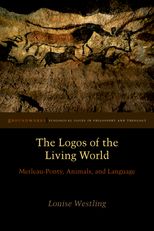The Logos of the Living World: Merleau-Ponty, Animals, and Language
The Logos of the Living World: Merleau-Ponty, Animals, and Language
Professor Emerita of English and Environmental Studies
Cite
Abstract
This book is an interdisciplinary work in environmental humanities that puts Maurice Merleau-Ponty’s philosophy into dialogue with evolutionary biology, animal studies, and literature, arguing for evolutionary continuity between human cultural and linguistic behaviors and the semiotic activities of other animals. It departs from most philosophic and critical animal studies which retain the traditional view of human exceptionalism. Differing from other studies of Merleau-Ponty’s work, this book emphasizes his lifelong attention to science, showing how his examination of evolutionary biology, embryology, and ethology anticipated recent studies of animal behavior, cognition, and communication. Each chapter explores literary questioning of human-animal relations from The Epic of Gilgamesh and Euripides’s Bacchae to Yann Martel’s Life of Pi. Chapter 1 introduces Merleau-Ponty’s philosophy of embodiment and dynamic intersubjectivity and chiasm in the context of the phenomenology introduced by Husserl and his proté;gé; Heidegger, with special emphasis on Merleau-Ponty’s engagement with science. Chapter 2 examines his exploration of animal studies and human animality, in which he insists that there is no evolutionary rupture between our species and other animals but instead a “strange kinship.” The final chapter explores Merleau-Ponty’s theory of language as embodied and gestural, placing it in the context of animal communication, especially among apes. It closes by examining his view that literature and the other arts are a distinctively human manifestation of the sedimentation of experience produced by all life forms on the planet. Here he anticipated the findings of biosemiotics.
-
Front Matter
- Introduction
- 1 A Philosophy of Life
- 2 Animal Kin
- 3 Language Is Everywhere
- Conclusion
-
End Matter
Sign in
Personal account
- Sign in with email/username & password
- Get email alerts
- Save searches
- Purchase content
- Activate your purchase/trial code
Institutional access
-
Sign in through your institution
- Sign in with a library card Sign in with username/password Recommend to your librarian
Institutional account management
Sign in as administratorPurchase
Our books are available by subscription or purchase to libraries and institutions.
Purchasing information| Month: | Total Views: |
|---|---|
| April 2023 | 2 |
| May 2023 | 2 |
| May 2023 | 3 |
| May 2023 | 3 |
| May 2023 | 2 |
| May 2023 | 3 |
| May 2023 | 7 |
| May 2023 | 4 |
| June 2023 | 1 |
| July 2023 | 1 |
| October 2023 | 1 |
| October 2023 | 1 |
| October 2023 | 1 |
| March 2024 | 4 |



Get help with access
Institutional access
Access to content on Oxford Academic is often provided through institutional subscriptions and purchases. If you are a member of an institution with an active account, you may be able to access content in one of the following ways:
IP based access
Typically, access is provided across an institutional network to a range of IP addresses. This authentication occurs automatically, and it is not possible to sign out of an IP authenticated account.
Sign in through your institution
Choose this option to get remote access when outside your institution. Shibboleth/Open Athens technology is used to provide single sign-on between your institution’s website and Oxford Academic.
If your institution is not listed or you cannot sign in to your institution’s website, please contact your librarian or administrator.
Sign in with a library card
Enter your library card number to sign in. If you cannot sign in, please contact your librarian.
Society Members
Society member access to a journal is achieved in one of the following ways:
Sign in through society site
Many societies offer single sign-on between the society website and Oxford Academic. If you see ‘Sign in through society site’ in the sign in pane within a journal:
If you do not have a society account or have forgotten your username or password, please contact your society.
Sign in using a personal account
Some societies use Oxford Academic personal accounts to provide access to their members. See below.
Personal account
A personal account can be used to get email alerts, save searches, purchase content, and activate subscriptions.
Some societies use Oxford Academic personal accounts to provide access to their members.
Viewing your signed in accounts
Click the account icon in the top right to:
Signed in but can't access content
Oxford Academic is home to a wide variety of products. The institutional subscription may not cover the content that you are trying to access. If you believe you should have access to that content, please contact your librarian.
Institutional account management
For librarians and administrators, your personal account also provides access to institutional account management. Here you will find options to view and activate subscriptions, manage institutional settings and access options, access usage statistics, and more.